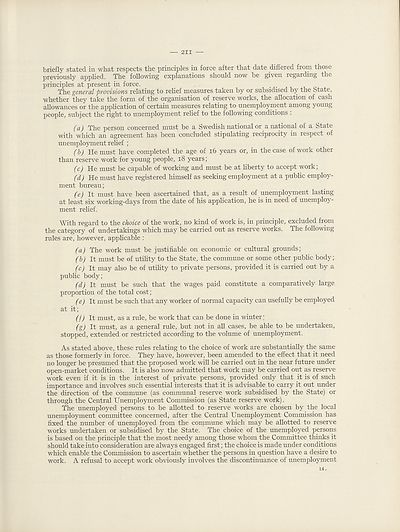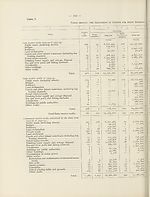Download files
Complete book:
Individual page:
Thumbnail gallery: Grid view | List view

211
briefly stated in what respects the principles in force after that date differed from those
previously applied. The following explanations should now be given regarding the
principles at present in force.
The general provisions relating to relief measures taken by or subsidised by the vState,
whether they take the form of the organisation of reserve works, the allocation of cash
allowances or the application of certain measures relating to unemployment among young
people, subject the right to unemployment relief to the following conditions :
(a) The person concerned must be a Swedish national or a national of a State
with which an agreement has been concluded stipulating reciprocity in respect of
unemployment relief ;
(b) He must have completed the age of 16 years br, in the case of work other
than reserve work for young people, 18 years;
(c) He must be capable of working and must be at liberty to accept work;
(d) He must have registered himself as seeking employment at a public employ¬
ment bureau;
(e) It must have been ascertained that, as a result of unemployment lasting
at least six working-days from the date of his application, he is in need of unemploy¬
ment relief.
With regard to the choice of the work, no kind of work is, in principle, excluded from
the category of undertakings which may be carried out as reserve works. The following
rules are, however, applicable :
(a) The work must be justifiable on economic or cultural grounds;
(h) It must be of utility to the State, the commune or some other public body;
(c) It may also be of utility to private persons, provided it is carried out by a
public body;
(d) It must be such that the wages paid constitute a comparatively large
proportion of the total cost;
(e) It must be such that any worker of normal capacity can usefully be employed
at it;
(j) It must, as a rule, be work that can be done in winter ;
(g) It must, as a general rule, but not in all cases, be able to be undertaken,
stopped, extended or restricted according to the volume of unemployment.
As stated above, these rules relating to the choice of work are substantially the same
as those formerly in force. They have, however, been amended to the effect that it need
no longer be presumed that the proposed work will be carried out in the near future under
open-market conditions. It is also now admitted that work may be carried out as reserve
work even if it is in the interest of private persons, provided only that it is of such
importance and involves such essential interests that it is advisable to carry it out under
the direction of the commune (as communal reserve work subsidised by the State) or
through the Central Unemployment Commission (as State reserve work).
The unemployed persons to be allotted to reserve works are chosen by the local
unemployment committee concerned, after the Central Unemployment Commission has
fixed the number of unemployed from the commune which may be allotted to reserve
works undertaken or subsidised by the State. The choice of the unemployed persons
is based on the principle that the most needy among those whom the Committee thinks it
should take into consideration are always engaged first; the choice is made under conditions
which enable the Commission to ascertain whether the persons in question have a desire to
work. A refusal to accept work obviously involves the discontinuance of unemployment
14.
briefly stated in what respects the principles in force after that date differed from those
previously applied. The following explanations should now be given regarding the
principles at present in force.
The general provisions relating to relief measures taken by or subsidised by the vState,
whether they take the form of the organisation of reserve works, the allocation of cash
allowances or the application of certain measures relating to unemployment among young
people, subject the right to unemployment relief to the following conditions :
(a) The person concerned must be a Swedish national or a national of a State
with which an agreement has been concluded stipulating reciprocity in respect of
unemployment relief ;
(b) He must have completed the age of 16 years br, in the case of work other
than reserve work for young people, 18 years;
(c) He must be capable of working and must be at liberty to accept work;
(d) He must have registered himself as seeking employment at a public employ¬
ment bureau;
(e) It must have been ascertained that, as a result of unemployment lasting
at least six working-days from the date of his application, he is in need of unemploy¬
ment relief.
With regard to the choice of the work, no kind of work is, in principle, excluded from
the category of undertakings which may be carried out as reserve works. The following
rules are, however, applicable :
(a) The work must be justifiable on economic or cultural grounds;
(h) It must be of utility to the State, the commune or some other public body;
(c) It may also be of utility to private persons, provided it is carried out by a
public body;
(d) It must be such that the wages paid constitute a comparatively large
proportion of the total cost;
(e) It must be such that any worker of normal capacity can usefully be employed
at it;
(j) It must, as a rule, be work that can be done in winter ;
(g) It must, as a general rule, but not in all cases, be able to be undertaken,
stopped, extended or restricted according to the volume of unemployment.
As stated above, these rules relating to the choice of work are substantially the same
as those formerly in force. They have, however, been amended to the effect that it need
no longer be presumed that the proposed work will be carried out in the near future under
open-market conditions. It is also now admitted that work may be carried out as reserve
work even if it is in the interest of private persons, provided only that it is of such
importance and involves such essential interests that it is advisable to carry it out under
the direction of the commune (as communal reserve work subsidised by the State) or
through the Central Unemployment Commission (as State reserve work).
The unemployed persons to be allotted to reserve works are chosen by the local
unemployment committee concerned, after the Central Unemployment Commission has
fixed the number of unemployed from the commune which may be allotted to reserve
works undertaken or subsidised by the State. The choice of the unemployed persons
is based on the principle that the most needy among those whom the Committee thinks it
should take into consideration are always engaged first; the choice is made under conditions
which enable the Commission to ascertain whether the persons in question have a desire to
work. A refusal to accept work obviously involves the discontinuance of unemployment
14.
Set display mode to:
![]() Universal Viewer |
Universal Viewer | ![]() Mirador |
Large image | Transcription
Mirador |
Large image | Transcription
Images and transcriptions on this page, including medium image downloads, may be used under the Creative Commons Attribution 4.0 International Licence unless otherwise stated. ![]()
| League of Nations > Communications and transit > Enquiry on national public works > (213) |
|---|
| Permanent URL | https://digital.nls.uk/195001119 |
|---|
| Shelfmark | LN.VIII |
|---|
| Description | Over 1,200 documents from the non-political organs of the League of Nations that dealt with health, disarmament, economic and financial matters for the duration of the League (1919-1945). Also online are statistical bulletins, essential facts, and an overview of the League by the first Secretary General, Sir Eric Drummond. These items are part of the Official Publications collection at the National Library of Scotland. |
|---|---|
| Additional NLS resources: |
|

